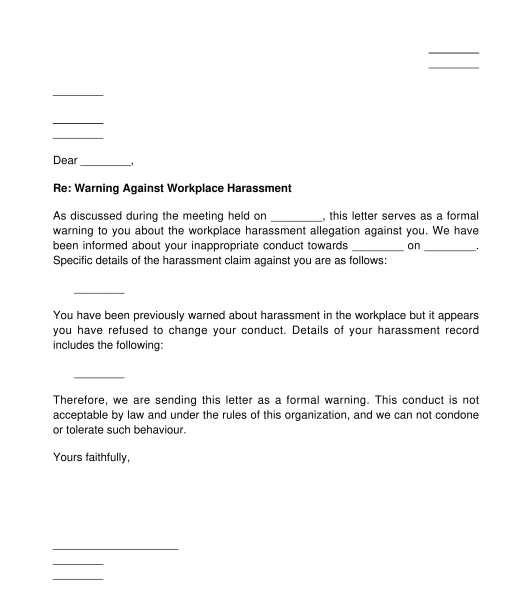 06/11/2025
06/11/2025

Answer a few questions and your document is created automatically.

Your document is ready! You will receive it in Word and PDF formats. You will be able to modify it.

 06/11/2025
06/11/2025
 Word and PDF
Word and PDF
 1 page
1 page



This Letter is used when an employer or their human resources officer receives a complaint regarding workplace harassment and wishes to warn the employee accused of harassment that the employer does not tolerate harassment. Workplace harassment is any form of verbal, physical, or sexual abuse or molestation within the work environment. Examples of workplace harassment include intimidation, undue pressure, insults, inappropriate and unpleasant workplace touching, and other forms of unwelcome behaviour toward an employee.
This letter is a simple document that only the employer or the employer's representative should use to warn someone who has harassed the employee (the defaulting party) at the workplace. The employer may conduct their investigations first before issuing this letter.
This document is only suitable for informing an accused employee about a harassment allegation against the employee. However, if an employee wishes to report a harassment incident at the workplace, the Letter to Report Workplace Harassment is more suitable.
In many organizations, the human resources manager or officer usually handles issues arising from employee relations in the workplace. Therefore, when an employer receives a workplace harassment complaint, they might want to investigate the matter before taking further action. After determining that sending a warning letter is a suitable approach to handle the issue, the human resources officer or any other authorized officer of the organization should send this letter to the defaulting employee.
When an employer receives a harassment complaint, the employer should follow the grievance procedure outlined in the Employee Handbook or Workplace Harassment Policy. However, if the employer does not have a policy, the first step is usually to issue a verbal or written warning, depending on the severity of the infraction. While verbal warnings may be sufficient in some cases, it is always necessary to have the warning in writing for proper documentation.
This document requires simple information, such as the full name of the employee who has complained about the harassment, the dates the harassment occurred, and the specific details of the harassment. After completing this document, it should be printed, and the employer or their authorized officer should sign the document. The employer should send this document to the defaulting employee. Alternatively, the employer can send this letter via email. The employer should keep this document for their record.
The Violation Against Persons (Prohibition) Act, of 2015 prohibits any form of harassment or violence in their private or public life. The Labour Act regulates employment relationships in Nigeria.
You fill out a form. The document is created before your eyes as you respond to the questions.
At the end, you receive it in Word and PDF formats. You can modify it and reuse it.
Employer's Warning Letter against Harassment - FREE
Country: Nigeria